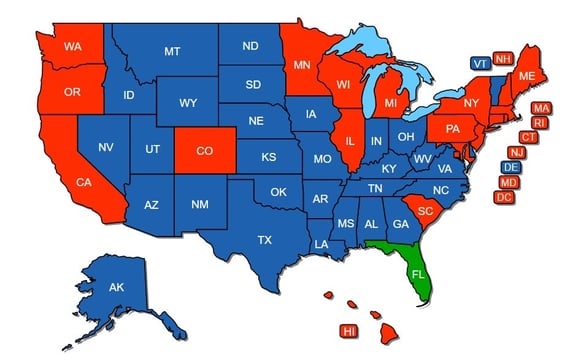Trump was elected under some rather strong premises. One of them was to uphold and strengthen the Second Amendment. With a Republican majority in the House and Senate, as well as the Executive Branch, we are curious to see how this plays out.
Believe it or not, it seems Republican legislative members have already fired up bills that would potentially open up concealed carry reciprocity across the nation.
Concealed carry reciprocity — the acknowledgement between two states of each’s valid right to issue concealed carry permits and licenses — has been the subject of a lot of contention.
In Virginia, we saw the Attorney General immediately revoke reciprocity with dozens of other states overnight in a political gesture to coerce lawmakers into going along with Governor McAuliff’s whims.
Because states set their level of reciprocity with other states, we end up with law-abiding citizens unwittingly becoming criminals by inadvertently crossing state lines.
President-elect Donald J. Trump does not have the authority to unilaterally decide long term policy for the United States. He governs it. It’s the job of the legislative branch to propose acts and measures which help concealed carriers.
So what is active at the federal legislative level that could help fix this?
Here’s the first one that’s waiting around in the Senate’s Judicial Committee:
Constitutional Concealed Carry Reciprocity Act of 2015
Proposed as Senate Bill 498 in the 114th Congress (2015-2016), the Constitutional Concealed Carry Reciprocity Act of 2015 aims to allow valid concealed carry permit holders a unilateral right to move between state lines so long as they abide by those state’s rules and regulations.
Amends the federal criminal code to authorize a person who is not prohibited from possessing, transporting, shipping, or receiving a firearm under federal law, who is entitled and not prohibited from carrying a concealed firearm in his or her state of residence or who is carrying a valid state license or permit to carry a concealed weapon, and who is carrying a government-issued photographic identification document, to carry a concealed handgun (which has been shipped or transported in interstate or foreign commerce, other than a machine gun or destructive device) in any state in accordance with the restrictions of that state.
What does this mean?
So, IF you have the following:
- A valid concealed carry permit (or license)
- A valid form of government-issued ID (like a driver’s license)
- You’re allowed by law to possess a handgun
THEN
- You can carry that concealed handgun so long as you abide by the laws of that state.
This would invariably mean you need to be aware of the laws of the state you are carrying a concealed handgun in. It would also mean that you can’t automatically be considered a criminal so long as you are in possession of a concealed handgun in that state SO LONG AS YOU HAVE ALL OF THE ITEMS DESCRIBED ABOVE.
But, as we all know, each state defines its “gun free zones” differently. In some states, a school is a prohibited place. In other states, municipal buildings are prohibited.
The concealed carrier has to be aware of every detail relating to this and abide by those state laws if he wants to remain on the right side of this reciprocity law.
This bill is backed by a similar one, under the same title, in the House of Representatives.
National reciprocity or national permitless authority would certainly be a marked improvement upon forcing otherwise law-abiding citizens to inadvertently break the law by crossing state lines.
But there are other areas that need improvement as well.
As Bearing Arms pointed out in their article, in addition to national reciprocity measures already making their way through the House and Senate, Trump DOES have the authority to change the following:
1. Allow Concealed Carry On Military Or Department of Defense Facilities
Right now, in order to have the authority to carry a private handgun onto a military facility, you need the express authorization of the commanding officer of that base. This has resulted in military personnel having to forgo their ability to carry a handgun on base.
Trump could remove this barrier altogether with the help of Congress.
2. National Instant Criminal Background Check System (NICS) Needs Reform
Both gun control advocates and ardent gun supporters both agree that the current NICS system doesn’t work. There are gaps in the information and how that information updates. Matched with a small full-time staff running the checks, the NICS has become a great example of federal government bureaucracy.
What we need is to reform this system to ensure that people’s records are correct at the time it’s checked — not another five additional checks after it.
Our best guess is that it will take Trump’s cabinet to get this moving along.
While there are certainly areas we could all see the federal government improving, we ultimately need to ensure that law-abiding citizens are protected. Removing unnecessary “gun free zones” and restricting the ability for states to arbitrarily not issue concealed carry permits would be a good, promising start to actual gun reform in America.










![[VIDEO/NSFW LANGUAGE] That Moment When You Accidentally Drive Up To A Gunfight](https://imagedelivery.net/sbm_lYeJbALkepJgtmRD5w/concealednation.org/2016/08/roxbury-shooting.jpg/w=728,h=381)



